Search
Showing 10 of 1193 results for Value-priced treatments https://simplemedrx.top
-
Highlights from Education Fairs and events in Japan and Viet Nam
Japan
In early October, ENZ welcomed 844 visitors to engage with 40 New Zealand education providers representing the school, vocational, English language and university sectors at the first New Zealand student fair in Japan since 2019.
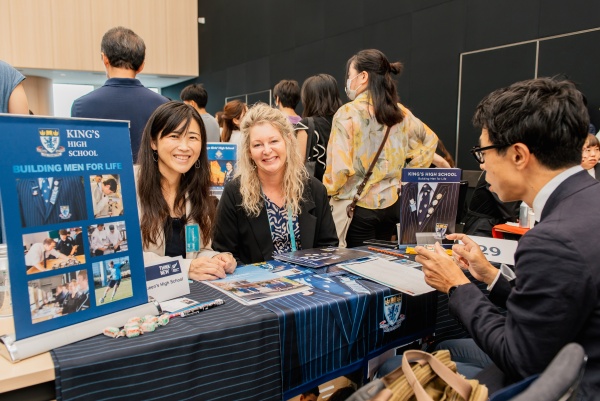
Teresa Robertson, International Director from King’s High School with Eriko Ishiguro, an interpreter.
The fair at Roppongi Academy Hills in Tokyo on 1 October had a programme of events that highlighted the strong connections between our two countries. Over the following two days, 49 and 45 of the visiting New Zealand education providers attended the ENZ Agent Seminars in Tokyo and Osaka respectively. Both seminars saw a record number of local agents and education providers, with 181 present in Tokyo and 77 in Osaka.
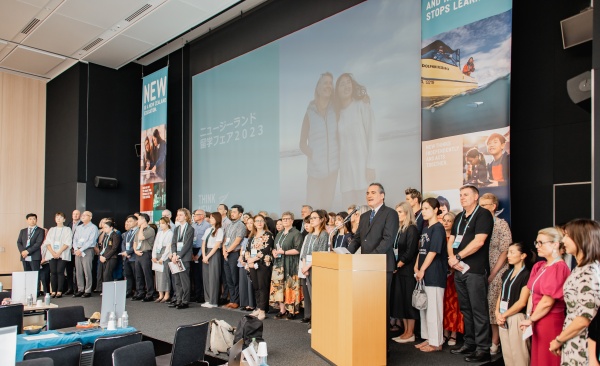
His Excellency Hamish Cooper, New Zealand Ambassador to Japan with the New Zealand contingent. The New Zealand education providers sang two waiata to support the Ambassador’s speech. A recording of ENZ’s waiata ‘Manapou ki te Ao’ was played and explained in Japanese to convey the waiatas’ meaning and lyrics.
Misa Kitaoka, ENZ’s Director of Education - Japan said that these events proved a great opportunity for the institutions to network with local school representatives, education and travel experts and gain valuable insights into the Japanese market. She also said that there was an evident increase in interest in long-term study in New Zealand both at the school and tertiary levels, compared with pre-Covid.
"This new trend is testament to the well-established presence New Zealand now has as a study destination in Japan. It can also be attributed to the effects of the Japanese government’s internationalisation policy in the education sector. With over 200 International Baccalaureate schools in Japan, more students are bilingual and eligible for direct entry to New Zealand universities.
There are also over 500 Japanese universities now adopting ‘sogo gata senbatsu’ (comprehensive admissions) that provide a holistic assessment of the applicants including their English language skills and overseas experience. This means that more students are choosing to complete secondary school education in New Zealand to apply to Japanese universities,” said Misa.
The education events along with pre-departure briefings where Japanese market insights were shared and the welcome reception upon arrival with key Japanese education stakeholders and partners were all well-received by the education providers in attendance.
Kerrie Hodgson, Internationalisation Business Partner, Te Pūkenga New Zealand Institute of Skills and Technology said it was clear that great effort was put into promoting the events and New Zealand education. “The numbers were high, and I felt that enquiries were more in depth than previous years, and beyond English Language study,” said Kerrie.
Renee Millner, International Director for Western Heights School in Rotorua added that the market insights provided ahead of their arrival were a great introduction to significant changes within the Japanese market.
Viet Nam
Following the action-packed week in Japan, the focus shifted to Viet Nam where the ENZ teams held several New Zealand education events in Ho Chi Minh City and Ha Noi.
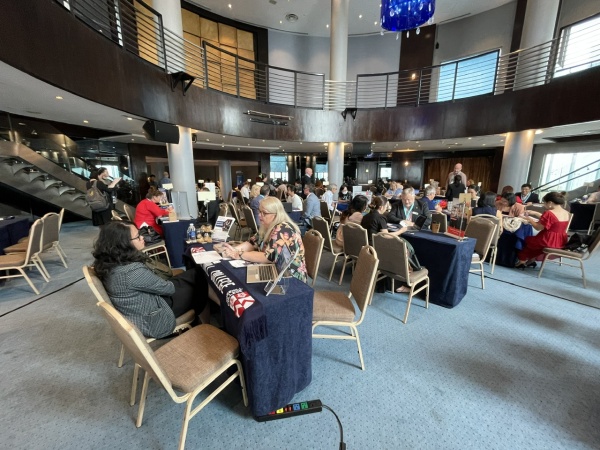
NZ institutions had one-to-one meetings with Vietnamese agents at two ENZ Agent Seminars in Viet Nam.
The series of events began with 19 NZ Masterclasses delivered over two weekends. Over 800 students registered for these online classes, in which New Zealand academics delivered a 40-minute lesson. This was followed by recruitment representatives introducing the entry requirements, scholarship opportunities and benefits of studying in New Zealand. Following the masterclasses, representatives of all eight New Zealand universities visited several schools in Ho Chi Minh City and Ha Noi, presenting to students and their families at information sessions and in some cases, taking part in mini-fairs.
Ho Chi Minh City was then host to two flagship ENZ events; the Agent Seminar and Counsellors Meet-up and following this, the NZ Education Day Fair. There was significant interest in both events with 50 Vietnamese agents meeting with 29 New Zealand institutions while 25 Viet Nam schools’ counsellors met with all New Zealand universities and Te Pūkenga. The New Zealand Education Fair saw over 500 visitors through the event with 385 leads generated.
Ha Noi followed suit with the Agent Seminar and Counsellors Meet-up attracting 40 Vietnamese agents meeting with 27 New Zealand institutions while eight Viet Nam school counsellors met with all New Zealand universities and Te Pūkenga. The events finished with a second popular Education Fair with visitors estimated at about 400 people resulting in 258 student leads.
Van Banh, ENZ's Market Manager for Viet Nam said that this year's education events had a mix of the traditional with a more interactive, modern, and sustainable approach which resonated well with attendees.
"Our team wanted to make these events as fun and interactive as possible to show what a New Zealand education is all about. In addition to the one-to-one opportunities for students and parents to talk to the New Zealand institutions, there were workshops with the participation of key opinion leaders, and well-known English IELTS trainers. There were also activities run by our partners such as English skills testing and minigames about New Zealand.
“We also took a more sustainable and innovative approach to our events to support the messaging that we communicate to students about New Zealand being a country that cares about sustainability and the environment, with an eye to the future through innovation. We replaced traditional printed backdrops with digital ones shown on TV screens for each booth, significantly reducing our waste and energy usage in manufacturing production. Our main stage also had a set of three interactive and eye-catching LED screens.
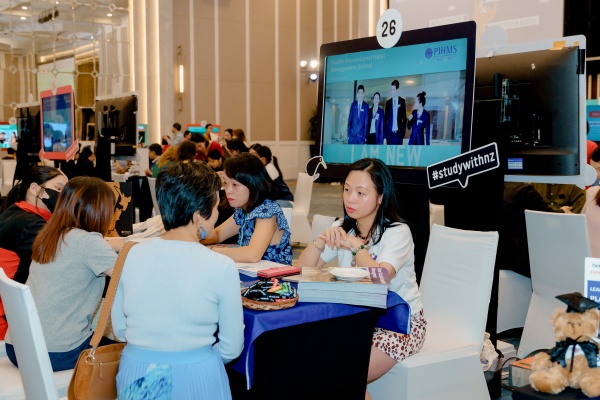
ENZ’s Regional Director for Asia, Ben Burrowes, attended both events and said, “on behalf of the ENZ teams in Viet Nam and Japan, I would like to extend a huge thank you to the New Zealand education providers who attended our events this year.
“As we all know, these face-to-face connections are extremely valuable as we continue to rebuild New Zealand’s education brand in such an important region for our sector. We look forward to hosting you again soon."
-
Come back to NZ! Nau mai hoki mai rā!
Education New Zealand Manapou ki te Ao (ENZ) is inviting New Zealand education providers to take part in an initiative to encourage students from Thailand who have previously studied here to return to New Zealand for further study. Providers are invited to subsidise travel for returning students - up to a maximum of NZD $3,000 for students returning for a year or more.
The scheme will work by students or agents providing proof of previous study and once the students are in New Zealand, can rebate the air fare back to their account through coordination with their agents. The amount students can rebate is based on the receipt of their booked travel but no more than the $3,000 cap. New Zealand schools who were involved in the recent education events in Thailand gave positive feedback on this concept.
ENZ will publicise the initiative online, via agents, the Ministry of Foreign Affairs and Trade, and media. Education agents will also be asked to co-promote this with us while KTC credit card, the scheme’s credit card partner, will be promoting this campaign and additional benefits through their own database and PR channels.
If you are an education provider interested in signing up or finding out more about the campaign, please click here.
-
Beware of phone scam targeting visa holders in New Zealand
The scam states the call is coming from 'The Immigration Bureau' saying there is a 'serious problem with your visa'. The call then prompts recipients to press different numbers for English or Chinese services.
Please be aware that this is not a genuine call from Immigration New Zealand.
If you or someone you know receives this call, do not engage any further and hang up the call.
New Zealand visa holders – including international students – receiving this call and needing reassurance on their current visa situation can call Immigration New Zealand’s Service Centre to discuss any visa matters directly.
Read this article to learn what to do if you, or someone you know are targeted by this phone scam.
-
2024 ENZ Events Calendar confirmed
ENZ is offering a range of 17 events in seven countries in 2024 including commercial fairs, New Zealand fairs, and agent seminars. The events are broken down as follows:
-
2 global events
-
9 agent seminars
-
5 ENZ student events
-
1 commercial event
All events can be found on the events calendar.
Registration
Registration for NAFSA 2024 is currently open. We will be opening events for pre-registration for other 2024 events over the coming weeks.
Pricing
Prices for these events have seen a 10% increase, the first increase since 2015. This is due to an increase in inflation and the resulting rise in event organisation costs. The new prices are as follows (all exclude GST):
-
New Zealand fairs $1650
-
Agent seminars $275
-
Commercial fairs $2750
Please contact events@enz.govt.nz with any questions.
-
-
“Feedback is a gift” - Education New Zealand Manapou ki te Ao’s 2023 Sector Survey
We would like to thank the many respondents who took the time to answer the survey, including universities, schools, Private Training Establishments, English Language Schools, education product and services companies, Te Pūkenga, peak bodies, and regional economic development agencies.
Undertaken annually, the survey helps ENZ to understand what is important to the sector, what services and support provide the most value, and where there are opportunities for ENZ to improve our offerings.
In 2023, 73% of the sector agreed that ENZ’s services and support over the past year had added value to their organisation, Business and market advice and E-News were ranked as the most useful services.
Areas such as ENZ’s in-market advice and informed intelligence were highlighted as being helpful to the sector in making timely, informed decisions, as is the support to re-establish and consolidate presence in existing markets while exploring new growth opportunities. The opportunities that ENZ provides for international partnerships was also highlighted as helpful.
The survey is also important in identifying the areas in which the sector would like ENZ to focus more. This included more advance notice on upcoming events and opportunities, providing more clarity on the range of services and support available and building more strategic partnerships across the wider sector.
Sharon-May McCrostie, ENZ’s Director of Sector Engagement said that while this survey is held annually, ENZ welcomes ongoing feedback on how ENZ can best support the New Zealand international education sector to grow.
“These surveys are considered an important scorecard for us to understand where we are meeting expectations with our stakeholders but also opportunities to improve our support to the sector.
“Looking ahead to 2024, the sector has said it would like to see us improve our engagement around integrating views of the sector in our planning and promoting the value that the international education sector brings to NZ,” added Sharon-May.
For information on ENZ’s digital tools, resources, and insights available to the NZ international education sector, check out MaiENZ.
-
Large contingent of New Zealand education providers at China’s biggest international education events
Kicking off the series of events was the China Annual Conference and Expo for International Education (CACIE) in Beijing from 26 to 28 October. Over 4500 participants from 60 countries and regions attended CACIE 2023. This event is China’s largest annual international education conference and this year saw 16 New Zealand providers spanning all our education subsectors exhibiting at the ENZ hosted New Zealand Pavilion.
New Zealand’s representation was amongst a total of 18 national pavilions and 326 education providers from 33 countries and regions. An estimated 20,480 attended the CEE Beijing fair in person over the two days and our participation generated visibility and fostered relationships with speaking appearances, media interviews and engagement with senior Chinese stakeholders during the conference.
ENZ’s Regional Director, China, Michael Zhang said that the highlight of the government-sponsored event was having New Zealand being offered speaking slots for several keynotes, helping raise the visibility of a New Zealand education to a wide audience, especially given the level of competition from other countries at the Expo.
“The New Zealand pavilion once again secured the prime spot in the expo and during the conference, a reflection of our excellent in-market and government relationships and an important factor in helping to regain New Zealand's visibility in China’s international education sector.
“The student mobility activity in China has come roaring back this year following the pandemic. The market is huge, but competition is fierce. A few key takeaways from this major event were how student enquiries are becoming much more outcomes driven, career focused and detailed in comparison around offerings, compared to the start of the year where students had more broad questions about a New Zealand education.
“It’s also clear students in China are increasingly shopping around and applying to more study destinations before making a decision. This suggests we need to strengthen our efforts around conversion to ensure we remain competitive, and students will choose New Zealand when faced with offers from multiple destinations” added Michael.
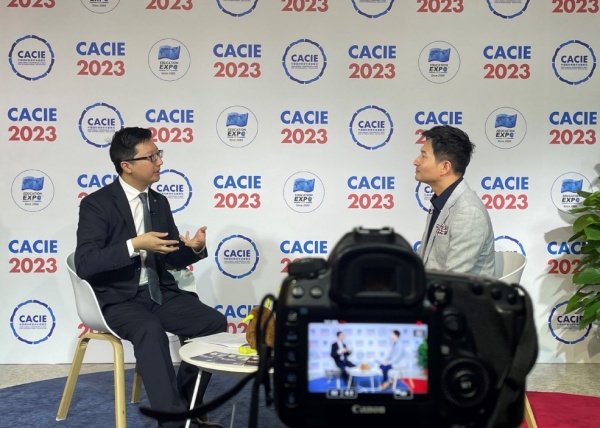
ENZ’s Regional Director, China, Michael Zhang, undertook several media interviews, including with tier one Chinese education media channels Study Abroad magazine and China Education Television. ENZ also facilitated media interviews between Chinese media and New Zealand providers at our national pavilion.
Following the China Education Expo, a series of agent seminars were held in Beijing, Shanghai and Guangzhou between 30 October and 3 November.
The Beijing Agent Seminar hosted 38 providers and 80 agents and school counsellors with more counsellors from the international departments of public schools attending than in previous years. New Zealand Ambassador to China, HE Grahame Morton, attended the event and four representatives of Immigration New Zealand’s Beijing office were also on hand to engage with agents and delivered a series of presentations. These in-market presentations attracted full houses across the Beijing, Shanghai and Guangzhou events – reflecting a strong demand for capacity building from Chinese agents. Much of the interest was focused on student visa applications and processing, decision times, and troubleshooting issues.
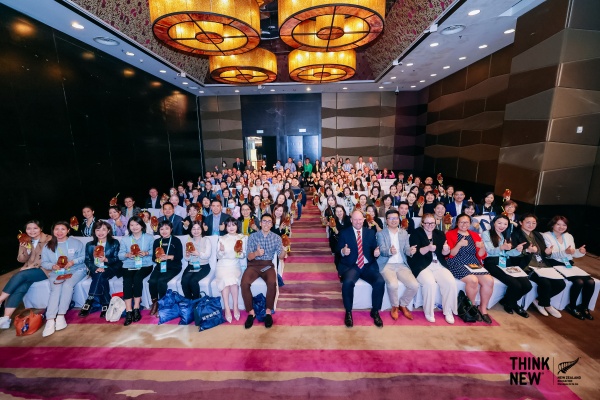
Attendees at the Beijing Agent Seminar
The Shanghai Agent Seminar saw over 100 agents meeting with the 40 New Zealand Education providers present, with New Zealand Consul-General Ardi Barnard providing opening remarks. An on-site livestream session reached 2,566 viewers across five platforms earning over 6,000 engagements. In total 28 NZ providers representing all sectors opted-in to undertake flash interview sessions during the livestream. Broadcasting by ENZ’s and partner agent online platforms, providers were able to introduce their institutions, programmes, and other features directly to prospective audiences online. Enquiries generated during the livestream are being followed up by ENZ who are directing them to the appropriate New Zealand education provider’s website or contact information and agents.
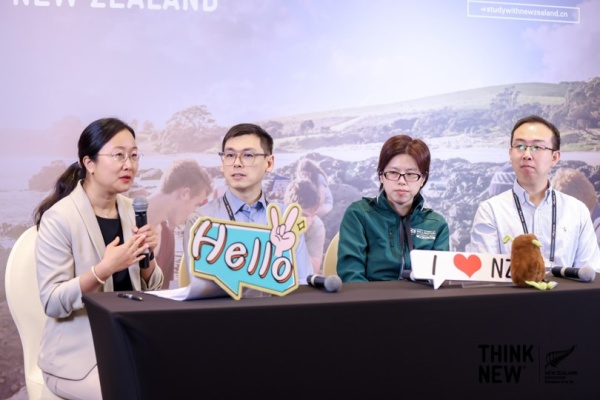
One of four livestream sessions that ENZ hosted featuring representatives from New Zealand universities, PTEs, Te Pūkenga and other tertiary institutions. ENZ gave advice to students and parents about how to choose study programmes based on the job market trends in both China and New Zealand.
Lastly, the Guangzhou Agent Seminar on 3 November saw 33 different New Zealand institutions meet with over 220 education agents and school counsellors. The seminar was supported by NZ Inc agencies and Rachel Crump, New Zealand’s Consul-General in Guangzhou, provided opening remarks for the events. A photo exhibition supported by MFAT, Connections through time, exhibited just outside the Agent Seminar space. Representatives from Tourism New Zealand and New Zealand Trade and Enterprise hosted a Study Tour photo booth at the Seminar while both agencies talked to interested agents about their New Zealand Study Tour Alliance.
In Guangzhou, eight local media outlets were invited to the event. They all spoke with sector representatives at the seminar about their programmes and enrolment requirements. As of 10 November, seven featured articles have appeared across these channels.
A big mihi/thank you again to all the New Zealand providers who helped make these events such a success.
-
Strong interest in NZ from Filipino students at the Te Pūkenga Agent Workshop and NZ Study Workshop 2023
55 education agents representing 27 agencies from across the Philippines attended the one-day workshop on 27 October. The workshop provided a valuable opportunity for the four Te Pūkenga representatives, including Bipul Das, Kerry Clarke, Prashanth Nallur Puttaswamy and Richard Cao, to share their most recent updates and developments, including information on Te Pūkenga’s vocational education offerings.
ENZ’s Market Manager – Philippines & Thailand, Chortip Pramoolpol, supplied an update on ENZ’s activities and showcased the array of tools and resources available to empower education agents in promoting New Zealand as a study destination. Joining the workshop remotely were key figures from Immigration New Zealand. Celia Coombes, Manager of International Education, Dolores Hyde, Senior Advisor for International Education, and Philippa Lee, Immigration Officer, Visa Operations, delivered a comprehensive briefing on student visa applications and post-study work rights. If any education agents would like a copy of the slides delivered by ENZ, they are available on IntelliLab here - ENZ Philippines.
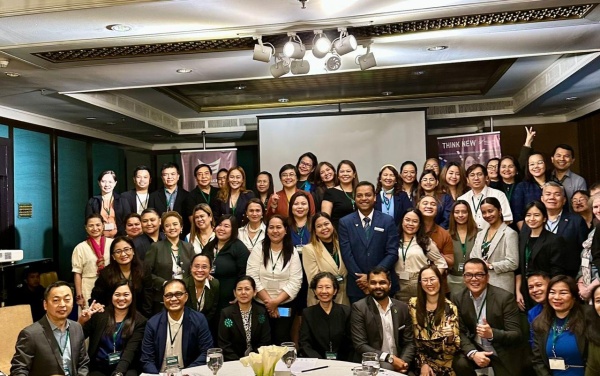
Bipul Das from Te Pūkenga’s International Team said that it was incredibly valuable to be able to meet face to face with education agents and prospective students in the Philippines.
“It was wonderful to see the education agencies are excited to promote New Zealand as the preferred study destination for vocational education and we are grateful for the support from ENZ, our Education Agents and INZ on the work being done in the Philippines market. We will continue to focus on growing our international student population from the Philippines, " said Bipul.
Following on from the workshop, ENZ and Te Pūkenga welcomed over 170 visitors to the NZ Study Expo 2023. The event provided a unique platform for attendees to explore the breadth of opportunities in New Zealand including specific courses, scholarships, and post-study opportunities and discuss these personally with the NZ representatives on-hand.
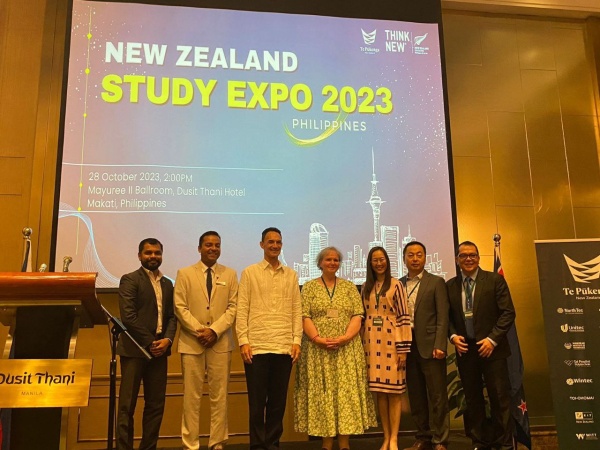
From left to right: Prashanth Nallur Puttaswamy, Bipul Das, His Excellency Peter Kell, New Zealand Ambassador to the Phillippines, Kerry Clarke, Chortip Pramoolpol, Richard Cao and Joel Miranda Angon.
New Zealand Ambassador His Excellency Peter Kell presided the event and shared his remarks, encouraging Filipinos and their families, to choose New Zealand as a destination to continue their education journey.
Ambassador Kell told the audience “This event is more than just a fair; it is a bridge that connects aspirations with opportunities. It is a platform for our Filipino students to explore and embrace new horizons, to acquire skills and knowledge that will empower you to become leaders in your chosen fields.
“New Zealand’s education system is often highly regarded and ranked in the world for preparing students for the future. Our education providers often have strong connections to industry and the business community. This facilitates internships, work placements, and real-world experiences for students, preparing them for the workforce,’ he added.
ENZ Market Manager – Philippines & Thailand, Chortip Pramoolpol, was excited to have had the opportunity to speak face to face with interested students and their families following the pandemic.
“There is certainly a lot to be said for being able to explain in-person to prospective students and their families, why they must consider New Zealand as a destination for future study and we were so pleased to see such genuine interest.
These events generated dozens of leads which has helped drive a significant increase in in visits and enquiries from Filipino students to the Study with New Zealand website,” added Chortip.
If any education providers or agents would like any additional information on marketing to students in the Philippines, please contact Chortip Pramoolpol – chortip.pramoolpol@enz.govt.nz
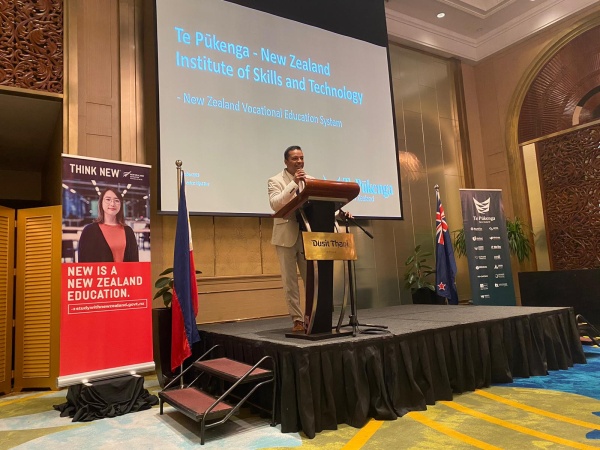
Bipul Das from Te Pukenga International Team presented on their programme offerings.
-
Auckland hosts Voice of The Oceans round the world expedition
Just over two years after leaving Brazil on the sailboat KAT to sail around the world, the Voice of The Oceans (VOO) initiative arrived in Auckland, New Zealand, at the beginning of November.
One of the initiative's leaders, David Schurmann, is an alumni from New Zealand – he studied Cinema at Auckland University of Technology (AUT) and at the South Seas Film & Television School in the 1990s. And since then, he was inspired by the ecological awareness of Kiwis. Throughout his career as a filmmaker, in addition to fiction films, David produced documentaries about the importance of preserving the environment.
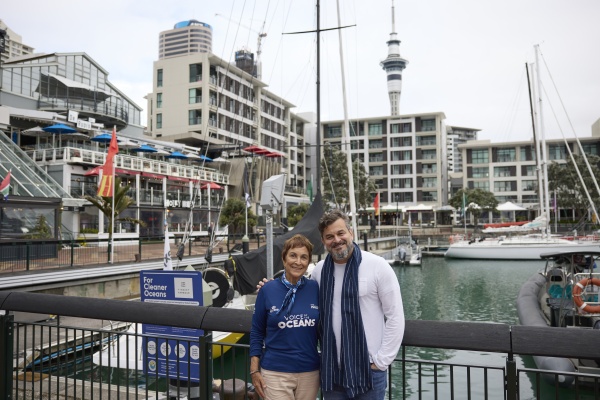
Eloisa and David Schurmann at Viaduct Harbour in front of the Voice of the Oceans sailboat KAT. Photo credit @annupam @withjane
VOO’s mission is to examine and record the environmental state of the oceans including plastic pollution so that this data can raise awareness and inform education, science, and innovation that improves the health of our oceans. It has the global support of the United Nations Environment Programme.
The VOO arrived in Auckland to mark the end of the first stage of their journey, after traveling for two years and visiting more than 100 destinations, recording the levels of plastic pollution they see as they go.
The arrival in Auckland featured the event “Brazil and New Zealand: Sustainability & Innovation” – guest panelists discussed how their businesses are innovating in the sustainable space. The event was organised by the Latin America New Zealand Business Council (LANZBC), the leading organisation focused on promoting business growth opportunities and collaborations in Latin America. Support for the event was provided by Education New Zealand Manapou ki te AO (ENZ), the Latin America Center of Asia Pacific Excellence (CAPES), and Viaduct Harbor Holdings (VHH).

Host and panellists at the at the Brazil and New Zealand: Sustainability & Innovation event included from left to right Guiliana Silveira, LANZBC CEO, Heloisa Schurmann, VOO, David Schurmann, VOO, Colum Rice, Mint Innovation, Phil Matheson, BioFab, Rachel Williams, Viva Expeditions Ltd , and Dhanya Herath, Climate Club. Photo credit @annupam @withjane

David and the VOO crew. Photo credit @annupam @withjane
Giuliana Silveira, CEO Latin America New Zealand Business Council (LANZBC) said that it was a privilege to work with Voice of the Oceans and these amazing NZ businesses to showcase what each of them is doing to innovate in the sustainability sector.
“We have to join forces to fight the climate crisis. We hope events, such as this, help to raise awareness and create a dialogue within the business and education communities to share our kaitiakitanga responsibilities," said Guiliana.

Following the panel discussion, attendees had the opportunity to mingle with the VOO crew and panelists. Photo credit @annupam @withjane
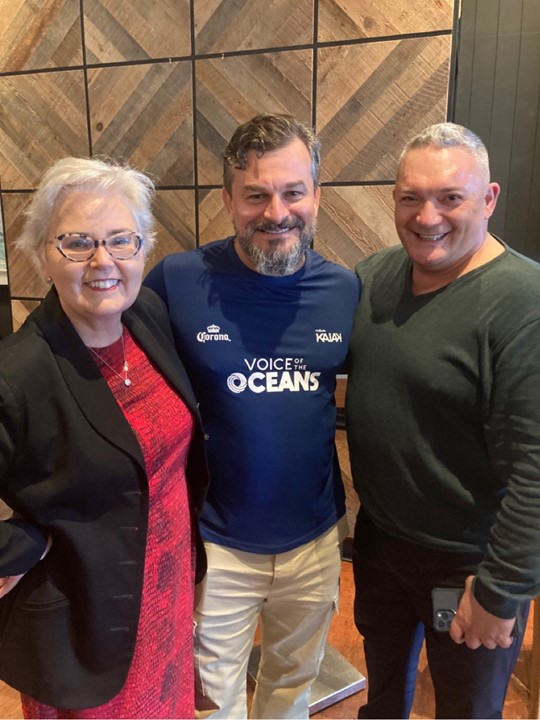
Wendy Kerr, ENZ’s General Manager Sector Engagement, and Ed Tuari, ENZ’s Manukura – Chief Advisor Maori, with David Schurmann, VOO during the event which was supported by ENZ along with the Latin America Center of Asia Pacific Excellence and Viaduct Harbor Holdings. The Latin America New Zealand Business Council organised and hosted the event.
Part of the arrival programme, also included over 70 children from Stanley Bay Primary School joining an environmental afternoon with talks by the Voice of The Oceans crew about the importance of taking care of the marine environment.
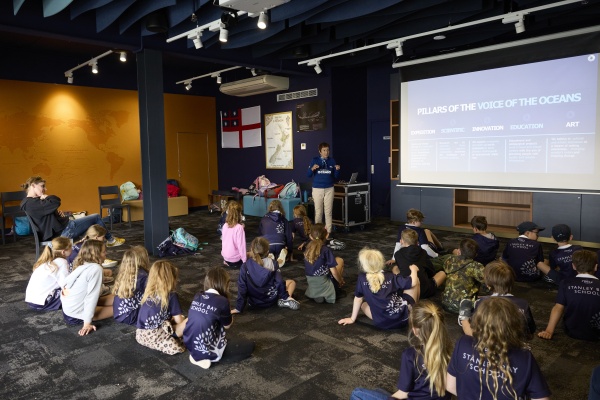
Eloisa Schurmann talks to the Stanley Bay School children about the importance of taking care of the ocean. Photo credit @annupam @withjane

As part of the sustainability tour, the children from Stanley Bay School were taken to the Viaduct Harbour Marina to view the sailboat Kat. Photo credit @annupam @withjane
“It's always a special moment to be back in New Zealand! We have a very close relationship with this country, which has been an important stop on all our major expeditions. My youngest sister Kat was born here, and I decided to stay in New Zealand during my families first expedition around the world, to study film making and start my career as a director”, said David Schurmann at the events in Auckland.
The VOO crew will spend the next few months in New Zealand to raise awareness about the state of Earth’s oceans before setting sail again to continue their trip around the world.
More information on VOO and their expedition can be found here - Voice of the Ocean - we turn people's attention to the ocean.
-
New Zealand Passenger Arrival Cards to be phased out
Customs New Zealand | Te Mana Ārai o Aotearoa has announced that Passenger Arrival Cards will be phased out, to be replaced by New Zealand Traveller Declaration | Whakapuakanga Tangata Haere ki Aotearoa cards by early 2024. There will be a transition period between 1 December 2023 and 31 March 2024, during which both Passenger Arrival Cards and New Zealand Traveller Declaration (NZTD) cards will be accepted. However, after 31 March 2024, only NZTD cards will be in circulation. These will be available through the NZTD mobile app or website. Paper forms will continue to be available for travellers who cannot complete the form online and will be accepted as a paper-based version of the digital NZTD at the air border. Passengers travelling by sea are not currently required to complete a digital declaration.
For more information on the traveller declaration process, please visit this page here - About | New Zealand Traveller Declaration.
-
International education delivers for New Zealand communities and visiting students
These are the key findings of two ENZ research projects to measure the student experience and the views New Zealanders hold towards international education.
Student experience in New Zealand
In the 2023 International Student Experience survey of 4,755 international students from more than 70 nationalities, 84 percent rated their overall experience positively, while another 83 percent said they would recommend New Zealand as a study destination.
Students were most positive about their personal development and outcomes, with 87 percent saying the experience helped encourage their curiosity and develop new ideas. Students were also very positive (88 percent) about the people and connections they made in New Zealand.
New Zealand was the first choice of study destination of 78 percent of respondents and 64 percent said their New Zealand experience had met or exceeded their expectations, which is consistent with previous research.
Commenting on the results, ENZ Student Experience Manager, Ross Crosson, said the results showed that New Zealand’s ability to deliver a quality education to international students had remained strong through the recent pandemic, and boded well for further recovery of the sector.
“The strong preference of students for New Zealand as a place where they can obtain a high-quality education while enjoying unique personal development really shone through in the student experience survey. It was heartening to hear about students growing their confidence because of their study experience in the country.
“We now want to make sure we’re using insights from the survey to inform our work – to ensure New Zealand continues to be the open, inclusive, and welcoming study destination it is known to be.”
ENZ’s Director Insights, Marie Clark, says the survey is a significant undertaking for ENZ and is an important resource for the international education sector.
"For one, it’s the only national survey of international students or indeed even students. We now have the beginnings of a valuable timeseries of data going back to 2019.
"It's important to be able to surface international student insights based on all sorts of variables, including country, sector or gender or a combination of these. We hope people working in the sector will find the sub-sector deep dives and Tableau dashboards particularly insightful resources,” she says.
The International Student Experience Survey 2023 Report is available here on IntelliLab.
Local benefits
In an ENZ survey of 1,100 New Zealanders conducted in December last year, 75 percent of respondents believe that international students benefit New Zealand.
The Ipsos Fast Facts survey, which drew responses from all regions of the country, saw 80 percent of respondents highlighting economic benefits, particularly in local communities, as a key reason for their positive view. Local and cultural contributions were also noted with 81 percent saying international students help local students learn about other cultures and ways of living, and contribute to New Zealand’s cultural diversity.
The results of the 2023 survey highlighted the continuing growth in support for international students and their positive impact on New Zealand since 2016 when only 57 percent believed international students helped the New Zealand economy and economic growth.
The proportion of New Zealanders who feel that international students make it harder for New Zealanders to get jobs also decreased from 34 percent in 2018 to 24 percent in 2023.
However, some respondents expressed concern that some international students use the New Zealand education system as a means to residency, while 32 percent felt New Zealand’s infrastructure in housing, transport and medical services is not well equipped to allow for international students.
Marie said the positive result from the domestic survey was also good news.
“International students have always been a significant contributor to regional economies. It is particularly pleasing that there is strong awareness and support of the cultural exchanges that happen when international students learn alongside New Zealand students and participate in our communities. While the research identified some challenges, the definite trend in awareness of the benefits international students bring to New Zealand is very positive for the future.”

